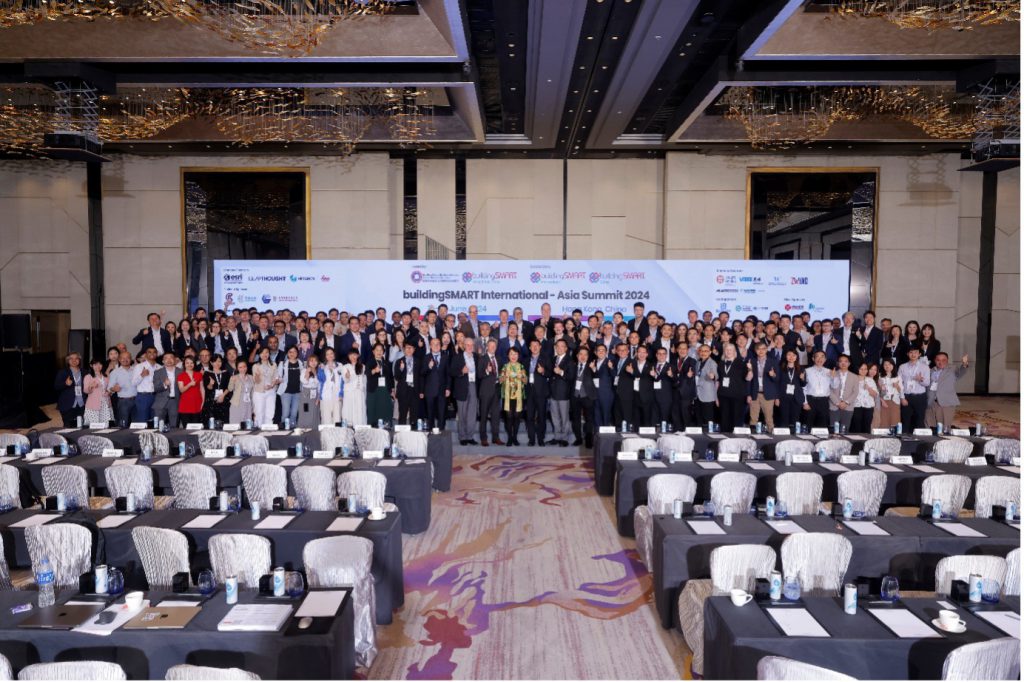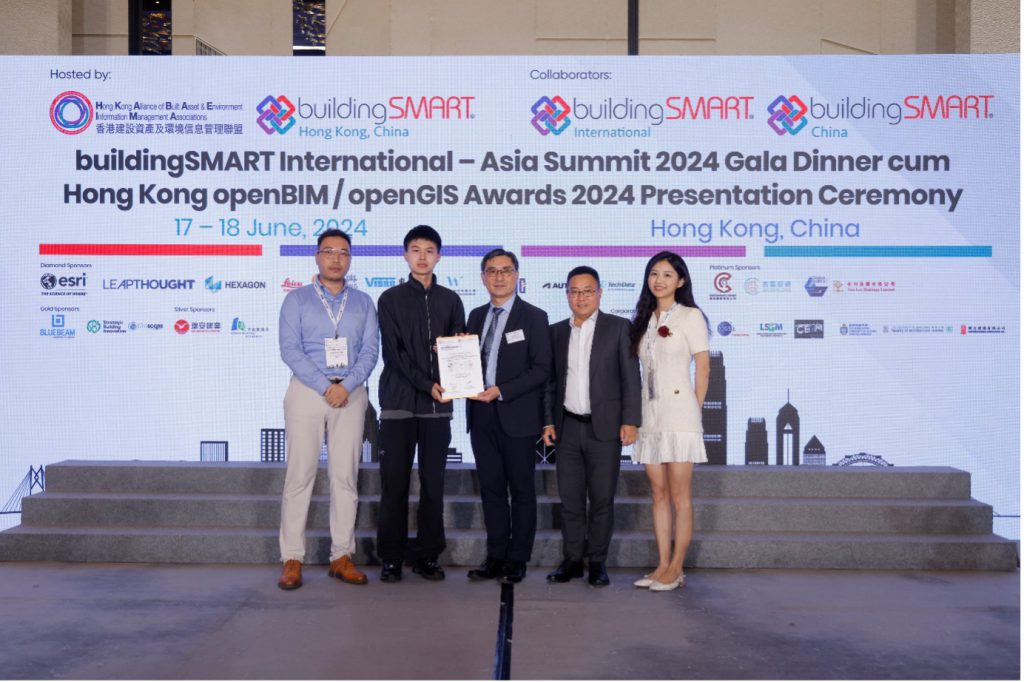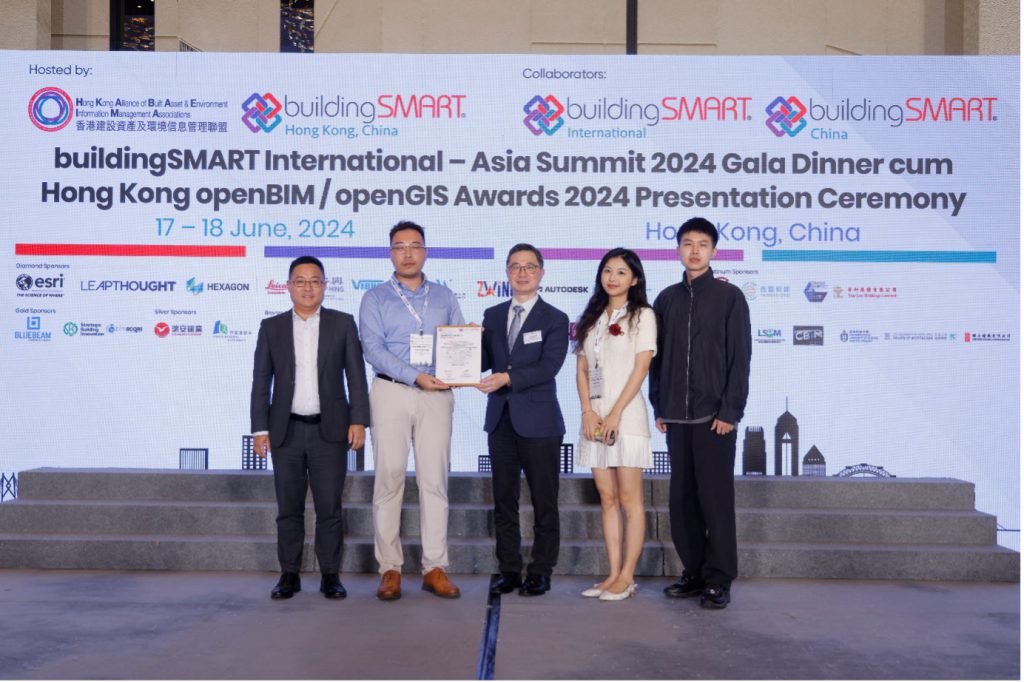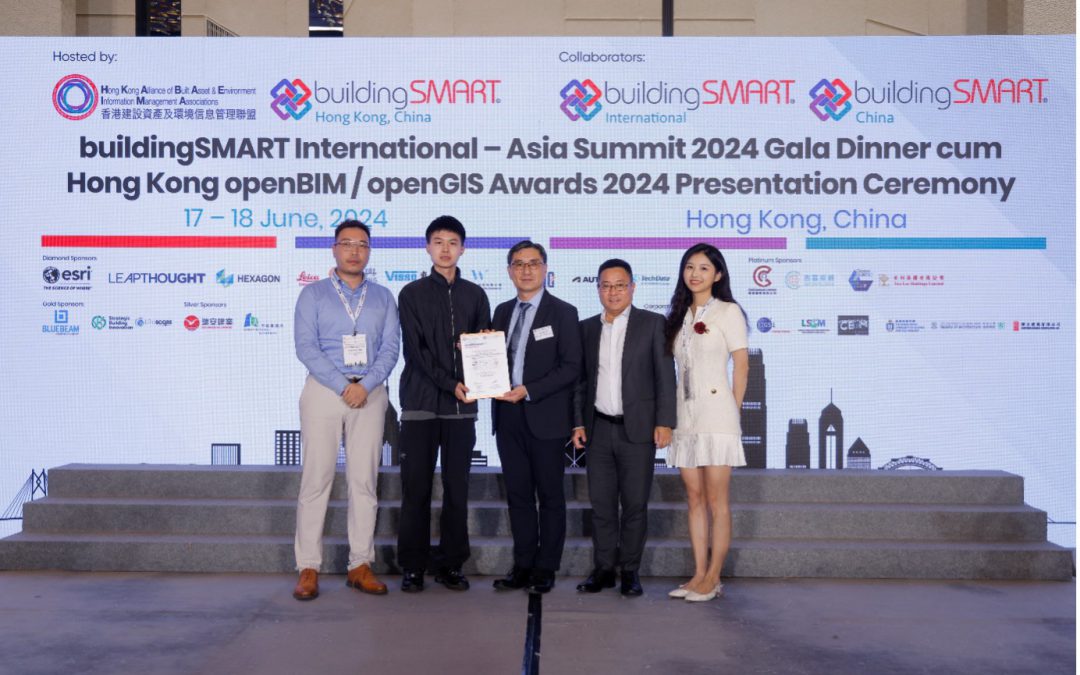iLab Wins Two Merit Awards at the Hong Kong openBIM/openGIS Awards 2024
We are delighted to announce that two innovative research projects of our department have won the Merit Awards in Hong Kong openBIM/openGIS Awards 2024, jointly organized by HKABAEIMA and buildingSMART International Hong Kong Chapter. On 18th June, Professor Wilson Lu, Professor Fan Xue, Dr. Junjie Chen, and team members from iLab attended the gala dinner and award presentation ceremony at buildingSMART International – Asia Summit 2024.

 The research titled “Minimizing Redundancy, Maximizing Traceability in OpenBIM/OpenGIS: A Blockchain 3.0 Virtual Disk for Built Assets Data Exchange” won the Merit Awards in student research category. This research is led by Professors Wilson Lu and Fan Xue, with the participation of Ph.D. students Lingming Kong, Rui Zhao and Jiajia Wang. This research addresses the inefficiency problem in building assets data exchange. This project introduces a tree-graph computational model on Blockchain 3.0 virtual disk to minimize data redundancy and maximize data traceability for secure data exchange between BIM and GIS models. By capturing semantic changes in data versions and storing them via blockchain transactions, the system ensures efficient, traceable and secure data exchange. Experimental results on real built assets datasets indicated that our Blockchain 3.0 virtual disk successfully minimized the semantic changes of openBIM/openGIS models as 0.007% and 0.009 of the input file sizes respectively. Every built asset is change-tracked via on our Blockchain 3.0 virtual disk with a quick search function at 5.3 milliseconds. As a result, built assets’ data exchange in the form of openBIM/openGIS becomes more efficient, traceable, and provenanced.
The research titled “Minimizing Redundancy, Maximizing Traceability in OpenBIM/OpenGIS: A Blockchain 3.0 Virtual Disk for Built Assets Data Exchange” won the Merit Awards in student research category. This research is led by Professors Wilson Lu and Fan Xue, with the participation of Ph.D. students Lingming Kong, Rui Zhao and Jiajia Wang. This research addresses the inefficiency problem in building assets data exchange. This project introduces a tree-graph computational model on Blockchain 3.0 virtual disk to minimize data redundancy and maximize data traceability for secure data exchange between BIM and GIS models. By capturing semantic changes in data versions and storing them via blockchain transactions, the system ensures efficient, traceable and secure data exchange. Experimental results on real built assets datasets indicated that our Blockchain 3.0 virtual disk successfully minimized the semantic changes of openBIM/openGIS models as 0.007% and 0.009 of the input file sizes respectively. Every built asset is change-tracked via on our Blockchain 3.0 virtual disk with a quick search function at 5.3 milliseconds. As a result, built assets’ data exchange in the form of openBIM/openGIS becomes more efficient, traceable, and provenanced.

The research titled “Automatic City Body Check by Harnessing the Power of AI and Open Geographical Big Data” won the Merit Awards in professional research category. This research is led by Professor Wilson Lu and Dr. Junjie Chen, with the participation of Research Assistant Zihan Huang and Post-doctoral Fellow Liupengfei Wu. This research aims to develop a fully automated approach for mass building dilapidation assessment by leveraging existing urban big data (e.g., street view and footprint). The central tenet is to triangulate AI-learnt defect features from street-side panoramas with urban footprint, which yields building-specific defective condition. The approach was tested with a case study in a massively blighted community in Hong Kong. Results demonstrated solid performance of the approach to map dilapidated buildings for an area of 2 million square metres with high accuracy (90.4% map for 4 defect types) and efficiency (120 minutes). This research contributes to the field of facility management and city renewal by providing a robust and scalable solution for mass dilapidation assessment of the urban building stock.

We sincerely congratulate these researchers for their outstanding achievements and significant contributions in advancing openBIM and openGIS technologies.

